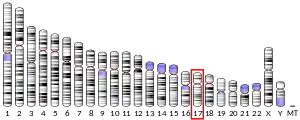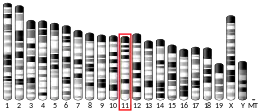| USP22 | |||||||||||||||||||||||||||||||||||||||||||||||||||
|---|---|---|---|---|---|---|---|---|---|---|---|---|---|---|---|---|---|---|---|---|---|---|---|---|---|---|---|---|---|---|---|---|---|---|---|---|---|---|---|---|---|---|---|---|---|---|---|---|---|---|---|
| Identifiers | |||||||||||||||||||||||||||||||||||||||||||||||||||
| Aliases | USP22, USP3L, ubiquitin specific peptidase 22 | ||||||||||||||||||||||||||||||||||||||||||||||||||
| External IDs | OMIM: 612116 MGI: 2144157 HomoloGene: 52664 GeneCards: USP22 | ||||||||||||||||||||||||||||||||||||||||||||||||||
| |||||||||||||||||||||||||||||||||||||||||||||||||||
| |||||||||||||||||||||||||||||||||||||||||||||||||||
| |||||||||||||||||||||||||||||||||||||||||||||||||||
| |||||||||||||||||||||||||||||||||||||||||||||||||||
| Wikidata | |||||||||||||||||||||||||||||||||||||||||||||||||||
| |||||||||||||||||||||||||||||||||||||||||||||||||||
Ubiquitin specific peptidase 22 is a protein that in humans is encoded by the USP22 gene on chromosome 17.[5] USP22 is known to function as a histone deubiquitinating component of the transcription regulatory histone acetylation (HAT) complex SAGA.[6]
References
- 1 2 3 GRCh38: Ensembl release 89: ENSG00000124422 - Ensembl, May 2017
- 1 2 3 GRCm38: Ensembl release 89: ENSMUSG00000042506 - Ensembl, May 2017
- ↑ "Human PubMed Reference:". National Center for Biotechnology Information, U.S. National Library of Medicine.
- ↑ "Mouse PubMed Reference:". National Center for Biotechnology Information, U.S. National Library of Medicine.
- ↑ "Entrez Gene: Ubiquitin specific peptidase 22".
- ↑ "Q9UPT9 (UBP22_HUMAN)". UniProt.
Further reading
- Lang G, Bonnet J, Umlauf D, Karmodiya K, Koffler J, Stierle M, Devys D, Tora L (September 2011). "The tightly controlled deubiquitination activity of the human SAGA complex differentially modifies distinct gene regulatory elements". Molecular and Cellular Biology. 31 (18): 3734–44. doi:10.1128/MCB.05231-11. PMC 3165722. PMID 21746879.
- Wang YL, Faiola F, Xu M, Pan S, Martinez E (December 2008). "Human ATAC Is a GCN5/PCAF-containing acetylase complex with a novel NC2-like histone fold module that interacts with the TATA-binding protein". The Journal of Biological Chemistry. 283 (49): 33808–15. doi:10.1074/jbc.M806936200. PMC 2590711. PMID 18838386.
- Armour SM, Bennett EJ, Braun CR, Zhang XY, McMahon SB, Gygi SP, Harper JW, Sinclair DA (April 2013). "A high-confidence interaction map identifies SIRT1 as a mediator of acetylation of USP22 and the SAGA coactivator complex". Molecular and Cellular Biology. 33 (8): 1487–502. doi:10.1128/MCB.00971-12. PMC 3624249. PMID 23382074.
- Zhang Y, Yao L, Zhang X, Ji H, Wang L, Sun S, Pang D (August 2011). "Elevated expression of USP22 in correlation with poor prognosis in patients with invasive breast cancer". Journal of Cancer Research and Clinical Oncology. 137 (8): 1245–53. doi:10.1007/s00432-011-0998-9. PMID 21691749. S2CID 9026376.
- Ling SB, Sun DG, Tang B, Guo C, Zhang Y, Liang R, Wang LM (December 2012). "Knock-down of USP22 by small interfering RNA interference inhibits HepG2 cell proliferation and induces cell cycle arrest". Cellular and Molecular Biology. 58 Suppl: OL1803-8. PMID 23217440.
- Xiong J, Che X, Li X, Yu H, Gong Z, Li W (2012). Semsey S (ed.). "Cloning and characterization of the human USP22 gene promoter". PLOS ONE. 7 (12): e52716. Bibcode:2012PLoSO...752716X. doi:10.1371/journal.pone.0052716. PMC 3530469. PMID 23300749.
- Glinsky GV, Berezovska O, Glinskii AB (June 2005). "Microarray analysis identifies a death-from-cancer signature predicting therapy failure in patients with multiple types of cancer". The Journal of Clinical Investigation. 115 (6): 1503–21. doi:10.1172/JCI23412. PMC 1136989. PMID 15931389.
- Xu H, Liu YL, Yang YM, Dong XS (January 2012). "Knock-down of ubiquitin-specific protease 22 by micro-RNA interference inhibits colorectal cancer growth". International Journal of Colorectal Disease. 27 (1): 21–30. doi:10.1007/s00384-011-1275-8. PMID 21773699. S2CID 25987858.
- Liu YL, Yang YM, Xu H, Dong XS (March 2011). "Aberrant expression of USP22 is associated with liver metastasis and poor prognosis of colorectal cancer". Journal of Surgical Oncology. 103 (3): 283–9. doi:10.1002/jso.21802. PMID 21337558. S2CID 30706374.
This article is issued from Wikipedia. The text is licensed under Creative Commons - Attribution - Sharealike. Additional terms may apply for the media files.



